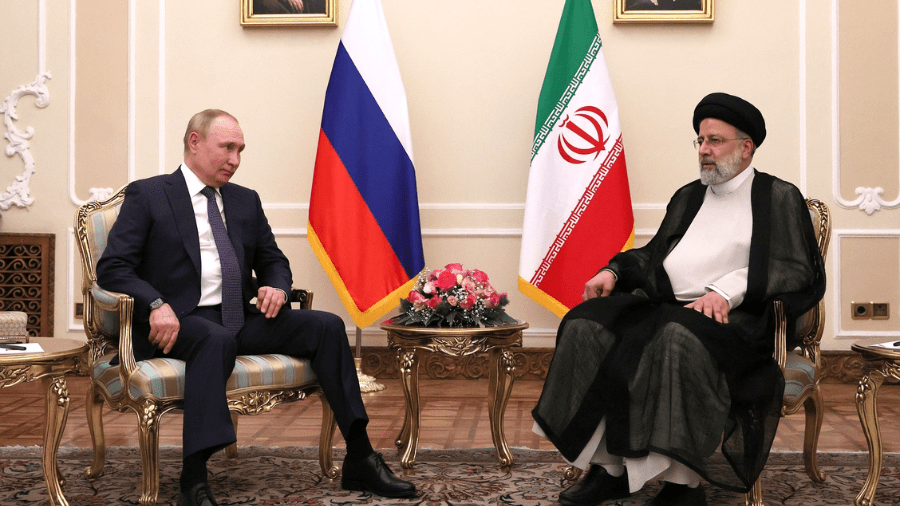This article originally appeared in the National Post.
By Marcus Kolga and Kaveh Shahrooz, November 10, 2022
Terror as a tactic is not new; the targeting of civilians to evoke fear and affect political change is as old as warfare itself. However, our understanding of terrorism and commitment to hold those engaged in such atrocities to account must evolve. Two clear examples can be seen today with the Russian army’s brutal and illegal invasion of Ukraine and Iran’s Islamic Revolutionary Guard Corps (IRGC).
The Canadian Criminal Code defines terrorism as an act committed “in whole or in part for a political, religious or ideological purpose, objective or cause” with the intent of intimidating the public “with regard to its security, including its economic security, or compelling a person, a government or a domestic or an international organization to do or to refrain from doing any act.”
By that definition, the Russian armed forces and the IRGC both meet the bill.
Vladimir Putin’s invasion of Ukraine has become a war of terror with regular atrocities being committed against civilians. The Russian army seeks to break down Ukrainian resolve through terror, from targeted strikes on apartment blocks, schools, hospitals and shopping malls to the use of indiscriminate Iranian-supplied kamikaze drones, grotesque and unimaginable massacres of civilians, and even the rape and torture of young children in front of their parents by Russian soldiers (as documented by the UN).
In addition, Russia has engaged in nuclear blackmail, threatening the use of nuclear weapons on multiple occasions, while also targeting and mining civilian power plants.
These are not just excesses of war; they are acts designed to terrorize Ukrainians and the world into submission. Having proven itself incapable of beating Ukraine on the battlefield, the Russian army, with supplies from Iran, is attempting to inflict as much suffering as possible on Ukrainians and the rest of the world until Putin gets his way. Make no mistake, such acts clearly rise to the level of terrorism.
When it comes to the IRGC, it must be noted that Prime Minister Justin Trudeau has already acknowledged that Iran’s notorious military organ engages in terrorism. But while one branch of the IRGC, the foreign-facing Quds Force, is listed as a terror group in Canada, the IRGC in its entirety is not. This is despite the fact that it has been implicated in embassy bombings, attacks on Jewish people, atrocities against Syrians, and the mass murder of Iranian protesters. It also is responsible for the downing of Ukraine International Airlines Flight PS752, killing all 176 crew and passengers, including 55 Canadian citizens and 30 permanent residents.
Terrorism is inseparable from the IRGC; it is in its DNA, engaging in the brutal tactics one might easily associate with al-Qaida and other terrorist entities. Trudeau and Deputy Prime Minister Chrystia Freeland both recognized this reality during a recent press conference when they repeatedly called the IRGC a terror group, only to avoid listing it as such under the Criminal Code.
Iran and Russia are now working together in forming an axis of terror. IRGC fighters are training Russians to use Iranian-made drones to terrorize Ukraine’s civilian population.
Why is it so critical that we brand these actors as terrorists? First, it opens up pathways to broader sanctioning of those involved with advancing terrorism. Funding and affiliating with these organizations would become criminal offences, allowing our security and intelligence agencies to root out agents. It would also help facilitate justice for the victims of these regimes and offer mechanisms for aiding them.
Declaring official state organs as terrorist may be challenging, particularly given that their members are sometimes conscripts. But the U.S. has already declared the IRGC a terrorist entity, so Canada would be walking a well-worn path. And just as was done after 9/11, if our current legal regime is not equipped to tackle terrorism when committed by the Russian army, the Kremlin’s Wagner Group mercenaries or the IRGC, that is only a sign that our laws must change.
Russian and IRGC atrocities must be met with some form of justice. Rather than allowing their terror to go unpunished, the global community should clearly condemn it, signalling a warning to other authoritarian regimes tempted to employ such criminal tactics.
Condemning and punishing terrorism reinforces a stronger rules-based order and a more secure global community. Standing idle and reticent in the face of terrorism merely encourages it. Such collective silence is to our collective shame. It is time for Canada and other democratic countries to follow up strong rhetoric with matching action by labelling the Russian army and the IRGC for what they so plainly are: terrorist organizations.
Marcus Kolga and Kaveh Shahrooz are Senior Fellows at the Macdonald-Laurier Institute.






